History
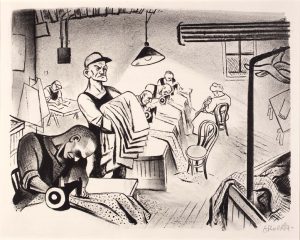 In a day and age when we see protests so often that we often pay very little attention, it’s easy to think that the protestors are just being ridiculous, and sometimes they are. That makes it easy to overlook the situations that really should be protested, or at least greeted with outrage. I suppose that every issue that is protested has its outrage, and sometimes the only way to get the attention an issue needs is to walk out and protest. Sometimes protests are simply the last resort.
In a day and age when we see protests so often that we often pay very little attention, it’s easy to think that the protestors are just being ridiculous, and sometimes they are. That makes it easy to overlook the situations that really should be protested, or at least greeted with outrage. I suppose that every issue that is protested has its outrage, and sometimes the only way to get the attention an issue needs is to walk out and protest. Sometimes protests are simply the last resort.
On this day, September 4, 1894, 12,000 tailors embarked on a strike to fight against the “sweatshop” system that exploited their labor. The tailors demanded that they be given a 10 hour work day, with an hour off for lunch. They wanted a weekly minimum wage and a weekly pay day. The “Protective Association” of cloakmaker manufacturers as well as important clothing dealers, “declared that they considered the demands of the men right, that no business which could not pay the workers the minimum wages asked ought to exist,” while “the 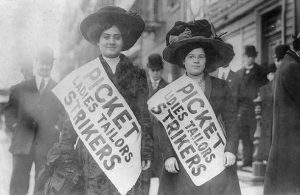 press and the public have also heartily sustained these demands, so that there can be no doubt that the public will pay, if necessary, the increased prices for the clothing rendered necessary.” While all that sounded good, the strike would continue through much of the fall. The striking workers said that the had to live half a year on what they could save out of the meager $4 per week they earned during the other half of the year. The year 1894 was a year of economic depression and widespread labor unrest. The strikes included the Pullman Strike, which paralyzed the railroads, and made Eugene Victor Debs America’s most important labor leader.
press and the public have also heartily sustained these demands, so that there can be no doubt that the public will pay, if necessary, the increased prices for the clothing rendered necessary.” While all that sounded good, the strike would continue through much of the fall. The striking workers said that the had to live half a year on what they could save out of the meager $4 per week they earned during the other half of the year. The year 1894 was a year of economic depression and widespread labor unrest. The strikes included the Pullman Strike, which paralyzed the railroads, and made Eugene Victor Debs America’s most important labor leader.
Labor conditions were atrocious in many cases, and the laborers often had little recourse. The big business owners had the control, and the laborers were at their mercy. If they wanted a job, they were to “shut up and do their job” or they wouldn’t have one. Many times these laborers had limited education, and so few options. 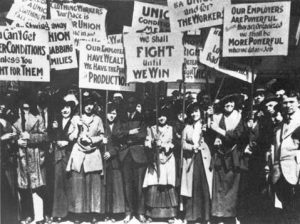 They also had families to support. Their wages were their lifeline, so they worked and worked, hoping that somehow they might create a better life for themselves and their families. These people were willing to work. All they asked for was a fair shake. Finally, they got to a point where they knew that they weren’t going to get that fair shake and they were left with no other options but to strike. It’s sad that it had to come to that point, but sometimes the strike and protest is all you have. There were other protests within the tailor industry, and many other industries too. Each one probably improved a few things, and eventually conditions got better. Of course, there will always be things to protest and people who will do so.
They also had families to support. Their wages were their lifeline, so they worked and worked, hoping that somehow they might create a better life for themselves and their families. These people were willing to work. All they asked for was a fair shake. Finally, they got to a point where they knew that they weren’t going to get that fair shake and they were left with no other options but to strike. It’s sad that it had to come to that point, but sometimes the strike and protest is all you have. There were other protests within the tailor industry, and many other industries too. Each one probably improved a few things, and eventually conditions got better. Of course, there will always be things to protest and people who will do so.
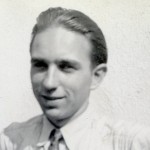
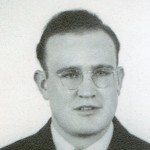 In August of 1964, my dad, Allen Spencer bought a Hollywood Reloading Press from his brother, William Spencer. Uncle Bill is two years older than my dad, and he loved his little brother, was always protective of him, and took him under his wing. As a little boy, Dad was really proud of his big brother, and wanted to say “brother” very badly, but he couldn’t quite get the word out correctly. Instead it always came out “Bowa” when Dad said it. After a while “Bowa” stuck, and the brothers both used it often. When Uncle Bill sent Dad the Reloading Press, he sent with it, a letter carefully explaining its safety instructions and its warnings. While going through Dad’s things, we came across that letter. It was such a treasure to find it, because it so perfectly depicted the relationship the brothers had.
In August of 1964, my dad, Allen Spencer bought a Hollywood Reloading Press from his brother, William Spencer. Uncle Bill is two years older than my dad, and he loved his little brother, was always protective of him, and took him under his wing. As a little boy, Dad was really proud of his big brother, and wanted to say “brother” very badly, but he couldn’t quite get the word out correctly. Instead it always came out “Bowa” when Dad said it. After a while “Bowa” stuck, and the brothers both used it often. When Uncle Bill sent Dad the Reloading Press, he sent with it, a letter carefully explaining its safety instructions and its warnings. While going through Dad’s things, we came across that letter. It was such a treasure to find it, because it so perfectly depicted the relationship the brothers had.
Always the big bowa, Uncle Bill was very excited that my dad wanted a reloading press, and since Uncle Bill was a gun dealer, who else would Dad have gone to when he wanted to make such a purchase. For those who don’t know, a Hollywood Reloading Press turns used ammunition into loaded ammunition again. Uncle Bill loved guns and all the accessories, and so it stood to reason that Dad would follow suit. The brothers had always used guns for hunting and safety, and even dynamite for blowing out tree stumps…and the occasional gate post. While boys would be boys, these boys weren’t troublemakers, but were rather careful and respected these items. They knew that improper use could be deadly. While my dad had grown up knowing about guns, Uncle Bill knew that he had not used a reloading press before, and he wanted to make sure nothing went wrong. It wasn’t that Uncle Bill thought my dad was careless, he just wanted him safe, and the reloader could bring danger, if not used correctly.
The letter, in my mind, was more about the love Uncle Bill had for my dad, than it was about the Hollywood 
 Reloading Press. Theirs was a close relationship that each of them treasured. Uncle Bill always loved writing letters. He always felt that the written documentation was forever. It carried with it the history of events that occurred in the life of the writer and the receiver. So few of us understand that, I think…at least not until it’s too late. The letter about the Hollywood Reloading Press will always be a treasure to all of my family. I’m sure that the letter was a treasure to my dad too, since he kept it all those years. And I will always think of “Bowa” when I think of the brothers now.
Reloading Press. Theirs was a close relationship that each of them treasured. Uncle Bill always loved writing letters. He always felt that the written documentation was forever. It carried with it the history of events that occurred in the life of the writer and the receiver. So few of us understand that, I think…at least not until it’s too late. The letter about the Hollywood Reloading Press will always be a treasure to all of my family. I’m sure that the letter was a treasure to my dad too, since he kept it all those years. And I will always think of “Bowa” when I think of the brothers now.
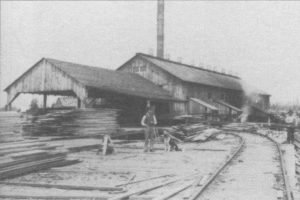
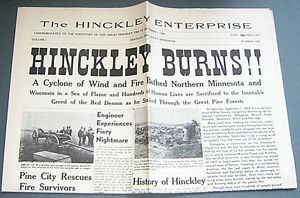 Every wildfire takes with it many victims. Humans, of course, are the most tragic, but they also take animals, homes, and plant life. When a fire gets out of control, devastation will soon follow. Often, all we think about is the loss, and that is a terrible thing, but sometimes something happens that brings a degree of victory and elation to an otherwise horrible situation. Such was the case in the September 1, 1894 Hinckley, Minnesota fire. The loss of life was devastating, with some accounts saying 440 and others saying 418…partly because the Indians weren’t counted in that amount, and partly because there were people who were never found.
Every wildfire takes with it many victims. Humans, of course, are the most tragic, but they also take animals, homes, and plant life. When a fire gets out of control, devastation will soon follow. Often, all we think about is the loss, and that is a terrible thing, but sometimes something happens that brings a degree of victory and elation to an otherwise horrible situation. Such was the case in the September 1, 1894 Hinckley, Minnesota fire. The loss of life was devastating, with some accounts saying 440 and others saying 418…partly because the Indians weren’t counted in that amount, and partly because there were people who were never found.
The upper Midwest of the United States was a wooded area, rich in timber. Hinckley was a lumber and rail town, that had been built along the Grindstone River in Minnesota near the Wisconsin border. The main industry was the lumber business, and the slash cutting technique left behind it large amounts of wood debris. The town was nicknamed The Town Built Of Wood. Little did they know what a tragic nickname that would turn out to be. The lumber yards were built quite close to the railroad tracks, and the sparks from the 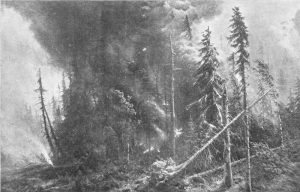 trains often set the wood debris on fire. Those fires were problematic, but no one expected the part the trains would play in 1894. That summer, a drought hit the Upper Midwest, making fires much more dangerous. The whole situation exploded on September 1, 1894, when fires near two rail lines south of Hinckley broke out, spreading north. When the raging fire reached the train depot, 350 of the residents got on a train to escape. The train passed right through flames, but reached safety in West Superior, Wisconsin. Were it not for this train, the loss of life would have been much higher. A number of the town’s residents took refuge in the swamps near town, but many of these people were killed, sadly some of them died by drowning. About 100 other residents fled to a gravel pit filled with water, and most of those people managed to survive. A train that was entering Hinckley from the north reversed direction to avoid the blaze. It still caught fire, and the only survivors were those who were able to jump from the train into a lake.
trains often set the wood debris on fire. Those fires were problematic, but no one expected the part the trains would play in 1894. That summer, a drought hit the Upper Midwest, making fires much more dangerous. The whole situation exploded on September 1, 1894, when fires near two rail lines south of Hinckley broke out, spreading north. When the raging fire reached the train depot, 350 of the residents got on a train to escape. The train passed right through flames, but reached safety in West Superior, Wisconsin. Were it not for this train, the loss of life would have been much higher. A number of the town’s residents took refuge in the swamps near town, but many of these people were killed, sadly some of them died by drowning. About 100 other residents fled to a gravel pit filled with water, and most of those people managed to survive. A train that was entering Hinckley from the north reversed direction to avoid the blaze. It still caught fire, and the only survivors were those who were able to jump from the train into a lake.
The fire burned 300,000 acres of town and forest, causing about $25 million in damages. In Hinckley, 228 people died, and another 200 in the surrounding areas, including 23 Ojibwa natives. It was a firestorm, with “as much force as an atomic bomb,” to quote a display at the town museum. Hinckley’s afternoon inferno also burned burned up five surrounding villages as it consumed over 400 square miles of kindling. It became known as the Great Hinckley Fire. A small group of statues in town represents survivors in the gravel pit. The Fire Monument and mass grave is on Fire Monument Road, very near the current interstate. Mass graves of 248 people are 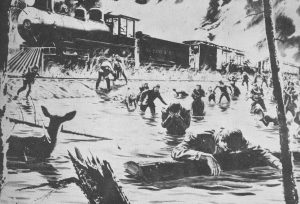
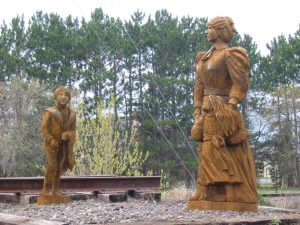 in lumpy mounds just behind the marker, dedicated in 1900 to the pioneers of civilization in Minnesota. Boston Corbett, killer of Abe Lincoln’s killer, is said to have left his “hole-in-the-ground home” in Kansas and died in the Great Hinckley Fire, in the neighboring town of Neodesha. The town of Hinckley has decided that the nickname The Town Built Of Wood is not one they want anymore, and their current slogan is “Relax…Have Fun!”
in lumpy mounds just behind the marker, dedicated in 1900 to the pioneers of civilization in Minnesota. Boston Corbett, killer of Abe Lincoln’s killer, is said to have left his “hole-in-the-ground home” in Kansas and died in the Great Hinckley Fire, in the neighboring town of Neodesha. The town of Hinckley has decided that the nickname The Town Built Of Wood is not one they want anymore, and their current slogan is “Relax…Have Fun!”
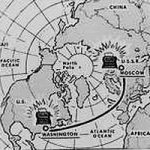 The United States and Russia have long been frenemies, truth be told, but in October of 1962, no one would have called them that. The Cuban Missile Crisis brought the two super powers to the brink of a nuclear conflict. As we all know, that would have been devastating for the inhabitants of the earth, and in the end, both countries agreed that we could not let things escalate to that level again. In June of 1963, American and Russian representatives agreed to establish a “hot line” between Moscow and Washington DC. The idea was to speed communication between the two governments to prevent an accidental war.
The United States and Russia have long been frenemies, truth be told, but in October of 1962, no one would have called them that. The Cuban Missile Crisis brought the two super powers to the brink of a nuclear conflict. As we all know, that would have been devastating for the inhabitants of the earth, and in the end, both countries agreed that we could not let things escalate to that level again. In June of 1963, American and Russian representatives agreed to establish a “hot line” between Moscow and Washington DC. The idea was to speed communication between the two governments to prevent an accidental war.
By August of 1963, the system was ready to be tested. American teletype machines were installed in the Kremlin and at the Pentagon. Many people have thought that the machine at the Pentagon was actually in the White House, but that is incorrect. The two nations exchanged 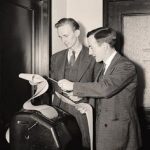 encoding devises so that they could decipher the messages. This would allow the two nations to message each other in a matter of minutes. That would be somewhat slow in today’s high tech world of cell phones and texting, but in those days, it was state of the art. Once received, the message would have to be deciphered, which did slow things down a bit, but again, at that time, it was state of the art. The two teletype machines were connected by a 10,000 mile long cable with “scramblers” along the way to ensure that the messages could not be intercepted by unauthorized personnel.
encoding devises so that they could decipher the messages. This would allow the two nations to message each other in a matter of minutes. That would be somewhat slow in today’s high tech world of cell phones and texting, but in those days, it was state of the art. Once received, the message would have to be deciphered, which did slow things down a bit, but again, at that time, it was state of the art. The two teletype machines were connected by a 10,000 mile long cable with “scramblers” along the way to ensure that the messages could not be intercepted by unauthorized personnel.
On August 30, the United States sent its first message to the Soviet Union over the hot line: “The quick brown fox jumped over the lazy dog’s back 1234567890.” The message was chosen because it used every letter and number key on the teletype machine in order to see that each was in working order. Moscow returned a message in Russian indicating that every key had worked properly. In the end, the hot line was never needed 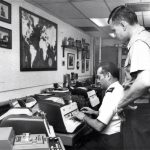 to prevent war, but instead has become a novelty item, used as a prop in movies about nuclear disaster. Fail Safe and Dr Strangelove were two movies that utilized the machines. The reality was that the two superpowers had come so close to mutual destruction back in 1962, that neither had much stomach for the proposed threat. They understood that communication was key in stopping a nuclear war. Of course, that has not stopped other nations from threatening to use nuclear weapons against other nations of the world. The Cold War ended a long time ago, but the “hot line” is still in operation between the two superpowers, and has since been supplemented by a direct secure telephone connection in 1999.
to prevent war, but instead has become a novelty item, used as a prop in movies about nuclear disaster. Fail Safe and Dr Strangelove were two movies that utilized the machines. The reality was that the two superpowers had come so close to mutual destruction back in 1962, that neither had much stomach for the proposed threat. They understood that communication was key in stopping a nuclear war. Of course, that has not stopped other nations from threatening to use nuclear weapons against other nations of the world. The Cold War ended a long time ago, but the “hot line” is still in operation between the two superpowers, and has since been supplemented by a direct secure telephone connection in 1999.
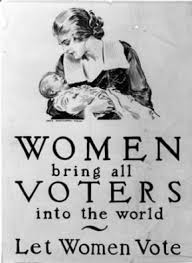 Anytime a group wants to change something in their nation, there is controversy. It really doesn’t matter what the change is, or whether it is good or bad for the country, there will always be people who are against it. The Women’s Suffrage movement, was no different. For more that seventy years, women had been fighting for the right to vote. From the founding of the United States they had not been allowed to vote, and I think originally it was simply because women were viewed as fragile and really to be protected. It didn’t really occur to the men that women could understand politics, wars, and government matters. They were to delicate. That opinion was largely accepted by the women too, until about 1849…73 years after our nation gained its independence from Great Britain. Then some of the women started thinking that they were are smart as the men, and should be allowed to vote too. They were right, of course, but their victory would not come without a long, hard battle. For many years the women who were fighting to vote were look at as
Anytime a group wants to change something in their nation, there is controversy. It really doesn’t matter what the change is, or whether it is good or bad for the country, there will always be people who are against it. The Women’s Suffrage movement, was no different. For more that seventy years, women had been fighting for the right to vote. From the founding of the United States they had not been allowed to vote, and I think originally it was simply because women were viewed as fragile and really to be protected. It didn’t really occur to the men that women could understand politics, wars, and government matters. They were to delicate. That opinion was largely accepted by the women too, until about 1849…73 years after our nation gained its independence from Great Britain. Then some of the women started thinking that they were are smart as the men, and should be allowed to vote too. They were right, of course, but their victory would not come without a long, hard battle. For many years the women who were fighting to vote were look at as 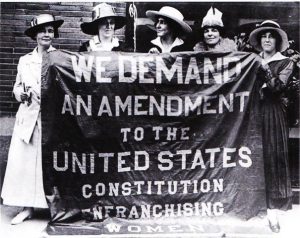 somehow being bold, and well simply not very refined. Proper women were encouraged to avoid them. The men heckled them. Everyone thought of these women as being somewhat trashy.
somehow being bold, and well simply not very refined. Proper women were encouraged to avoid them. The men heckled them. Everyone thought of these women as being somewhat trashy.
I can’t say for sure, just what it was that finally tipped the scales in favor of the women’s right to vote, but quite possibly it had something to do with the “squeaky wheel getting the oil” in the end. Nevertheless, like anything worth fighting for, you continue to fight until you win, or until there is no hope of winning. For the women of the United States, the battle would be won. Changes are sometimes tough to swallow…especially when we think they are 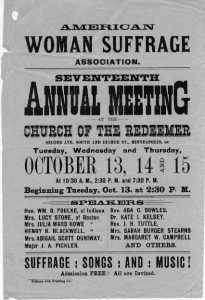 morally wrong. It doesn’t matter what day and age we live in, or what the issue is, someone, somewhere is going to be against the new idea. There will be battles that should be won and those that probably shouldn’t. Nevertheless, like it or not, once a new idea is made law, it usually stays law, unless the law is changed later on. Thankfully, for women everywhere, the right to vote was not repealed, and it will always be our right.
morally wrong. It doesn’t matter what day and age we live in, or what the issue is, someone, somewhere is going to be against the new idea. There will be battles that should be won and those that probably shouldn’t. Nevertheless, like it or not, once a new idea is made law, it usually stays law, unless the law is changed later on. Thankfully, for women everywhere, the right to vote was not repealed, and it will always be our right.
On this day August 26, 1920, the 19th Amendment, guaranteeing women the right to vote, is adopted into the United States Constitution by proclamation of Secretary of State Bainbridge Colby. Women could vote now and forever. People born since 1920, which is most of us, have no concept of the enormity of that amendment. It changed the face of politics, government, and campaigning forever. Not only could women vote, but they could run for office too. And that idea has been up for debate ever since.
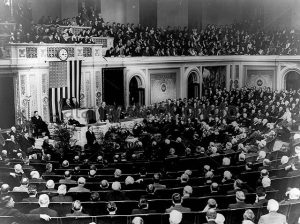
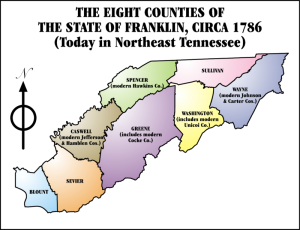 Have you heard of the nation of Frankland…or maybe the nation of Franklin? I hadn’t either, but it was a real place. Early in the history of the United States, its people operated on somewhat limited trust of the government…probably due to the treatment they received in England. In April of 1784, the state of North Carolina ceded its western land claims between the Allegheny Mountains and the Mississippi River to the United States Congress. The settlers who lived in that area, known as the Cumberland River Valley, had already formed their own government from 1772 to 1777, and their distrust of Congress led the to worry that the area might be sold to Spain or France to pay off war debts owed them by the government. Due to their concerns, North Carolina retracted its cession and started to organize an administration for the territory.
Have you heard of the nation of Frankland…or maybe the nation of Franklin? I hadn’t either, but it was a real place. Early in the history of the United States, its people operated on somewhat limited trust of the government…probably due to the treatment they received in England. In April of 1784, the state of North Carolina ceded its western land claims between the Allegheny Mountains and the Mississippi River to the United States Congress. The settlers who lived in that area, known as the Cumberland River Valley, had already formed their own government from 1772 to 1777, and their distrust of Congress led the to worry that the area might be sold to Spain or France to pay off war debts owed them by the government. Due to their concerns, North Carolina retracted its cession and started to organize an administration for the territory.
At the same time, representatives from Washington, Sullivan, Spencer (modern-day Hawkins) and Greene  counties declared their independence from North Carolina. Then, in May, they petitioned the United States Congress for statehood as Frankland. The simple majority favored the petition, but Congress could not get the two thirds majority to pass it…not even when the people decided to change the name to Franklin, in the hope of winning favor with Benjamin Franklin and some of the others.
counties declared their independence from North Carolina. Then, in May, they petitioned the United States Congress for statehood as Frankland. The simple majority favored the petition, but Congress could not get the two thirds majority to pass it…not even when the people decided to change the name to Franklin, in the hope of winning favor with Benjamin Franklin and some of the others.
When the petition failed to pass, the people in the area grew angry, and decided to defy Congress. On this day, August 23, 1784, they ceded from the union and functioned as the Free Republic of Franklin (Frankland) for four years. During that time, they had their own constitution, Indian treaties and legislated system of barter in lieu of currency. Two years into the Free Republic of Franklin’s history, North Carolina set up their own parallel government in the area. The economy was weak, and never really gained ground, so the governor, John Sevier approached the Spanish for aid. That move brought a feeling of terror in the government of North Carolina, and they arrested Sevier. The situation worsened when the Cherokee, Chickamauga and Chickasaw began to attack settlements within Franklin’s borders in 1788. Franklin quickly rejoined North Carolina to gain its militia’s protection from attack.
It was a short life for the little nation of Franklin, and eventually they wouldn’t even belong to North Carolina, but rather became a part of the state of Tennessee. It just goes to show that the growing pains of a nation can  take on many forms to reach their destiny as a whole nation. Some changes are good ones, and continue on into the future, and others are not so good, and are sometimes absorbed into the fabric of history and time, and end up looking nothing like the change they started out to be.
take on many forms to reach their destiny as a whole nation. Some changes are good ones, and continue on into the future, and others are not so good, and are sometimes absorbed into the fabric of history and time, and end up looking nothing like the change they started out to be.
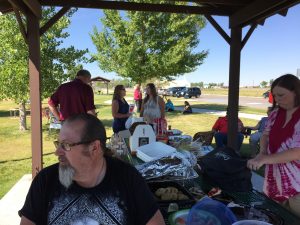 I think that in many ways, my mom’s family is unique. It all started with Grandma and Grandpa Byer, of course. The family had grown to a size that was far too big to get together at their house, so they came up with the idea of holding a family Christmas party at a central location in town, that would hold all of us. It was truly the only way for all of us to get together at the same time, but I think Grandma and Grandpa had an ulterior motive for doing this. They wanted their growing family to stay close, even though it wasn’t always easy. Most of the family still lives right here in Casper, but we are all very busy people, so getting together on any kind of a consistent basis is really hard, and it gets harder every year as we grow in size. Still, it was Grandma and Grandpa’s dream that we would not stop the get togethers, which has grown to include an annual family picnic in August.
I think that in many ways, my mom’s family is unique. It all started with Grandma and Grandpa Byer, of course. The family had grown to a size that was far too big to get together at their house, so they came up with the idea of holding a family Christmas party at a central location in town, that would hold all of us. It was truly the only way for all of us to get together at the same time, but I think Grandma and Grandpa had an ulterior motive for doing this. They wanted their growing family to stay close, even though it wasn’t always easy. Most of the family still lives right here in Casper, but we are all very busy people, so getting together on any kind of a consistent basis is really hard, and it gets harder every year as we grow in size. Still, it was Grandma and Grandpa’s dream that we would not stop the get togethers, which has grown to include an annual family picnic in August.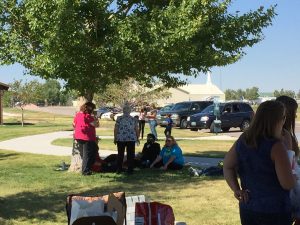
Every few years, the number of the original siblings seems to dwindle, and of course, each of the original siblings that are left are growing older. For that reason, I feel a strong urging to go to these events, to spend time with them. I’m not saying that everyone can make it, and that’s ok, but I feel the need. My aunts and uncles are getting older, and they have so much information that they can pass on to us…stories of their childhood and stories passed down from their parents. These are stories that will be lost if we don’t hear them now. Since my parents have passed away, I can’t ask them the things I have wondered about since they left. And I won’t say that I would have wondered those things while they were still alive, but I know that I wish that I had asked them many things about their families and their lives while they were still here, because I do wonder now, and now I’m stuck with unanswered questions where my parents are concerned. That is the thing I don’t want to have…those unanswered questions with my aunts and uncles too.
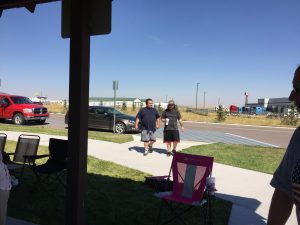
The Byer family Christmas party and the Byer family picnic are two chances for all of us to spend time with and talk to these precious people before it’s too late. What I have noticed is that the same people come to these events and I suppose that is how it will always be. We always have a wonderful time, and I do look forward to both the picnic and Christmas party. As I said, my mom’s family is unique…especially in that they hold two family reunions a year. We may not get the turnout that reunions that are further apart get, but no one can say that they didn’t have the opportunity…and any unanswered questions are purely the fault of those who would not come and ask.
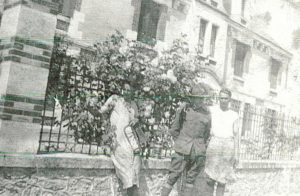 War is never pretty, and yet somehow, I had a picture in my head of the time my grandfather, George Byer spent in World War I that made it seem very benign. I never pictured him being in any danger. You see, my grandfather was a cook in the Army during the war, and somehow I pictured him working in a safe place where the war was a very distant reality, and not something to be faced or dealt with. The cooks in World War I didn’t even get a gun, so they must not be in danger…right? Wrong…very wrong!! The men on the front couldn’t drive home to the safety zone every night after work, like I had pictured in my head. The kitchen was very close to the front. In Grandpa’s case, that kitchen was a commandeered kitchen in the lowest floor of a French castle. As far as anyone knows, the residents of the castle still lived there, although I’m not sure how their meals were handled. Perhaps, their own cooks were allowed a little time in the kitchen, or maybe their meals were served along with the men in the Army. I don’t suppose we will know the full answer to that question in this lifetime.
War is never pretty, and yet somehow, I had a picture in my head of the time my grandfather, George Byer spent in World War I that made it seem very benign. I never pictured him being in any danger. You see, my grandfather was a cook in the Army during the war, and somehow I pictured him working in a safe place where the war was a very distant reality, and not something to be faced or dealt with. The cooks in World War I didn’t even get a gun, so they must not be in danger…right? Wrong…very wrong!! The men on the front couldn’t drive home to the safety zone every night after work, like I had pictured in my head. The kitchen was very close to the front. In Grandpa’s case, that kitchen was a commandeered kitchen in the lowest floor of a French castle. As far as anyone knows, the residents of the castle still lived there, although I’m not sure how their meals were handled. Perhaps, their own cooks were allowed a little time in the kitchen, or maybe their meals were served along with the men in the Army. I don’t suppose we will know the full answer to that question in this lifetime.
For a very long time…until just a few months ago, in fact, I carried the impression in my head that Grandpa’s job was really uneventful, other than the pressure of getting the meals to a large group of hungry men on time. Then, I came across a picture that I had seen several times over the past five years, but this time I was also 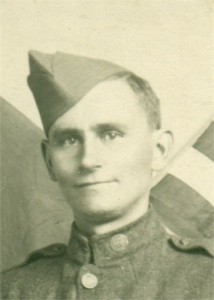 looking at the list my aunts had made about what the pictures were about. In that moment, my idea of my grandfather’s service was changed forever. On the list they had written, that the man on the right, or the man in uniform, was Grandpa. The second picture was tagged with, “Castle in France. Owner of castle died in Daddy’s kitchen” and “cooks, who worked under Daddy.” I was instantly intrigued. I spoke to my aunt, Sandy Pattan about it, and found out that indeed, the kitchen was commandeered for the Army’s use, and the owner had been wounded and ran into the kitchen for help. Grandpa tried to save him, but the wounds were too bad, and the owner died right there. The man’s injuries told me that the front was not far from the castle. I suppose you might think I was reaching a little on that thought, but you would be wrong, because as I talked with Aunt Sandy, she told me something else that really clarified the danger my grandfather lived with every day of his time in the service.
looking at the list my aunts had made about what the pictures were about. In that moment, my idea of my grandfather’s service was changed forever. On the list they had written, that the man on the right, or the man in uniform, was Grandpa. The second picture was tagged with, “Castle in France. Owner of castle died in Daddy’s kitchen” and “cooks, who worked under Daddy.” I was instantly intrigued. I spoke to my aunt, Sandy Pattan about it, and found out that indeed, the kitchen was commandeered for the Army’s use, and the owner had been wounded and ran into the kitchen for help. Grandpa tried to save him, but the wounds were too bad, and the owner died right there. The man’s injuries told me that the front was not far from the castle. I suppose you might think I was reaching a little on that thought, but you would be wrong, because as I talked with Aunt Sandy, she told me something else that really clarified the danger my grandfather lived with every day of his time in the service.
It was another day in the castle kitchen, the men were working on the next meal. Suddenly an American soldier ran in and told the cooks to run for the woods. It seemed strange to me that running would be the order they would receive, but remember that Aunt Sandy told me that the cooks had no guns. If they stayed in the castle, they would be sitting ducks, because cooks or not, they were in the American Army, and that made them enemies of the Germans. The reason the men were told to run for the woods…the Germans were coming 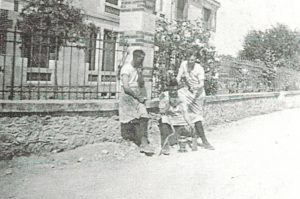 and they couldn’t stop them. The soldier didn’t have to tell the cooks twice. They dropped everything and ran. One of the cooks, while running into the woods, stepped on a dead man. The man had been dead a few days, because the cook’s foot went right into the man’s chest. Aunt Sandy told me that the smell was so bad and so permanent that when they couldn’t get the smell out of the man’s clothes, they had to be burned. I had no idea of the things Grandpa saw, nor of the danger he faced. It gave me a whole new picture of Grandpa Byer’s time in World War I. And I came to clearly realize that no job in the service is less dangerous than another…and least not on the front. It’s no wonder that most men don’t want to talk about the war.
and they couldn’t stop them. The soldier didn’t have to tell the cooks twice. They dropped everything and ran. One of the cooks, while running into the woods, stepped on a dead man. The man had been dead a few days, because the cook’s foot went right into the man’s chest. Aunt Sandy told me that the smell was so bad and so permanent that when they couldn’t get the smell out of the man’s clothes, they had to be burned. I had no idea of the things Grandpa saw, nor of the danger he faced. It gave me a whole new picture of Grandpa Byer’s time in World War I. And I came to clearly realize that no job in the service is less dangerous than another…and least not on the front. It’s no wonder that most men don’t want to talk about the war.
 I read in the paper on Monday about the 57th anniversary of the August 17, 1959 Hebgen Earthquake that created Earthquake Lake in Montana, just west of Yellowstone National Park. The 7.5 magnitude earthquake was the second strongest quake in the lower 48 states in the 20th century, according to the United States Forest Service, killing 28 people, including five people in one Idaho Falls family who were entombed in the ensuing landslide, and are still there to this day. I was only three years old when that quake occurred, so I wouldn’t remember it, nor am I aware that it was felt in Casper, Wyoming, where we live, although it might have been felt there too. Still, I doubt I would have remembered it.
I read in the paper on Monday about the 57th anniversary of the August 17, 1959 Hebgen Earthquake that created Earthquake Lake in Montana, just west of Yellowstone National Park. The 7.5 magnitude earthquake was the second strongest quake in the lower 48 states in the 20th century, according to the United States Forest Service, killing 28 people, including five people in one Idaho Falls family who were entombed in the ensuing landslide, and are still there to this day. I was only three years old when that quake occurred, so I wouldn’t remember it, nor am I aware that it was felt in Casper, Wyoming, where we live, although it might have been felt there too. Still, I doubt I would have remembered it.
What I do remember, is the trip our family took when I was a child, that included Earthquake Lake. I don’t recall whether I was told about the 28 people who died there, or the ones they never found, but I rather doubt 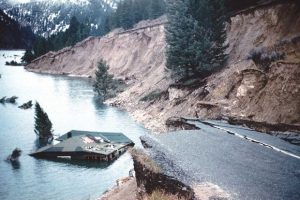 it, because things like that tend to be something that sticks with me…even really bothering me when I was younger, because I almost felt like I was a trespasser on their graves. These days, I realize that being near someone’s grave, whether in a cemetery or a natural grave such as Earthquake Lake became, is still nothing more than a final resting place. What impresses me more now is the sadness of the loss. That family was on vacation, and suddenly their lives were gone…over in an instant. Along with the loss of life, there was the damage to roads, making it even harder to bring help in to the people who were trapped, although I’m not sure it would have made much difference.
it, because things like that tend to be something that sticks with me…even really bothering me when I was younger, because I almost felt like I was a trespasser on their graves. These days, I realize that being near someone’s grave, whether in a cemetery or a natural grave such as Earthquake Lake became, is still nothing more than a final resting place. What impresses me more now is the sadness of the loss. That family was on vacation, and suddenly their lives were gone…over in an instant. Along with the loss of life, there was the damage to roads, making it even harder to bring help in to the people who were trapped, although I’m not sure it would have made much difference.
I remember feeling the enormity of the catastrophic event that took place that day a number of years earlier. I was impressed by the ability of an earthquake to change the face of the landscape around it. What had been the Madison River, was blocked by a massive landslide creating Earthquake Lake. The deaths were random. A couple, Edgar and Ethel Stryker were killed by a boulder that crushed them, while their three young sons, 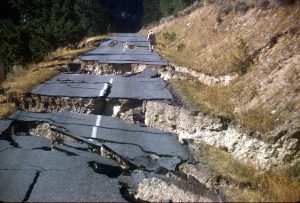 sleeping in a nearby tent, were unhurt. Irene Bennett and her son Phil were saved, but her husband Purley and their three other children were killed. Myrtle Painter died of her injuries, while her 16 year old daughter Carole survived. That was the story of the event, this one died, and that one lived. I think that while I probably didn’t know about all those deaths, that I still felt the sadness of that place, because it is a place I have never forgotten. An earthquake that happens in a rural area seems to make us think that it was simple a change of the landscape, but that is rarely the case. It seems that there are almost always a few people in the area, and that means a loss of life. A very sad event indeed.
sleeping in a nearby tent, were unhurt. Irene Bennett and her son Phil were saved, but her husband Purley and their three other children were killed. Myrtle Painter died of her injuries, while her 16 year old daughter Carole survived. That was the story of the event, this one died, and that one lived. I think that while I probably didn’t know about all those deaths, that I still felt the sadness of that place, because it is a place I have never forgotten. An earthquake that happens in a rural area seems to make us think that it was simple a change of the landscape, but that is rarely the case. It seems that there are almost always a few people in the area, and that means a loss of life. A very sad event indeed.
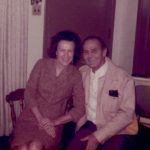
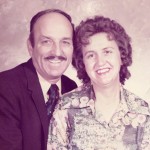 Saturday afternoon, after hiking the Bridle Trail on Casper Mountain, Bob and I went up to hike the Braille Trail with our daughter, Corrie Petersen, her husband Kevin and her son, Josh. Black out glasses were provided to give a sighted person an idea of what it is like to travel through life blind. Josh and I decided to hike that way, and what an experience that was. I must say that Blind Man’s Bluff will not prepare you for the reality of going through life blind. I have a lot of respect for any blind person who gets out and lives their life on their own terms. It would take a lot of courage. Of course, since I cannot read Braille, we took off the glasses at each sign that told about the area. It was very interesting to hear about the rocks, trees, the creek, and plant life we were seeing around us.
Saturday afternoon, after hiking the Bridle Trail on Casper Mountain, Bob and I went up to hike the Braille Trail with our daughter, Corrie Petersen, her husband Kevin and her son, Josh. Black out glasses were provided to give a sighted person an idea of what it is like to travel through life blind. Josh and I decided to hike that way, and what an experience that was. I must say that Blind Man’s Bluff will not prepare you for the reality of going through life blind. I have a lot of respect for any blind person who gets out and lives their life on their own terms. It would take a lot of courage. Of course, since I cannot read Braille, we took off the glasses at each sign that told about the area. It was very interesting to hear about the rocks, trees, the creek, and plant life we were seeing around us.
Then, we read the sign about the tornado that had torn through the Braille Trail in 1978. My memory files immediately took me back to July 20, 1978 at 6:40pm. No, I didn’t know that July 20th was the exact date or that 6:40pm was the exact time, but I’m quite sure it was. My Aunt Ruth Wolfe and her family had come to town to celebrate my parents’ 25th Wedding Anniversary, which was July 18, 1978. The memory was so vivid in my memory files that I can clearly see my Aunt Ruth standing in my parents’ kitchen. Suddenly, she stopped talking and almost ran to the back door. She said, “There’s a tornado somewhere!” She was so serious, but I was still skeptical…until we heard that there had indeed been a tornado on Casper Mountain at that exact time. I was stunned. How could she have known that? I was a young mother of two girls then, and had never been around a tornado. Casper doesn’t get a lot of them, even though we have had warnings, and even tornadoes in the area. Casper Mountain gets even fewer tornadoes than the main Casper area. Still, my aunt, who had been around a few of them, knew the atmospheric changes that precede a tornado, and she was certain that one had struck somewhere in our immediate area.
Now, over 38 years later, while walking a trail on the mountain, that whole scene replayed in my mind. Life is strange that way. Sometimes, memories come in and out of your life like you are watching a movie. It seemed so real that I felt like I could have walked across the room and touched my aunt. I remembered always being 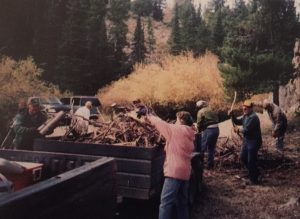 amazed at the wisdom she had concerning tornadoes. In reality, all of my parents siblings were that way. They had the wisdom that comes with their years on the earth. That was how Aunt Ruth got her wisdom too…living life. It was a great memory of her. As to the Braille Trail, since it had the dedication of the Lions Club and the community, the people came together, cleaned it up, and repaired the damage. The Braille Trail has been damaged a total of three times over the years of its existence…the 1978 tornado, the 1985 flood, and the 1995 winter storms, each time the damaged trees were removed, and the trail areas rebuilt, so that the trail could continue to serve the visually impaired and the community at large. I know I will definitely go back again.
amazed at the wisdom she had concerning tornadoes. In reality, all of my parents siblings were that way. They had the wisdom that comes with their years on the earth. That was how Aunt Ruth got her wisdom too…living life. It was a great memory of her. As to the Braille Trail, since it had the dedication of the Lions Club and the community, the people came together, cleaned it up, and repaired the damage. The Braille Trail has been damaged a total of three times over the years of its existence…the 1978 tornado, the 1985 flood, and the 1995 winter storms, each time the damaged trees were removed, and the trail areas rebuilt, so that the trail could continue to serve the visually impaired and the community at large. I know I will definitely go back again.

